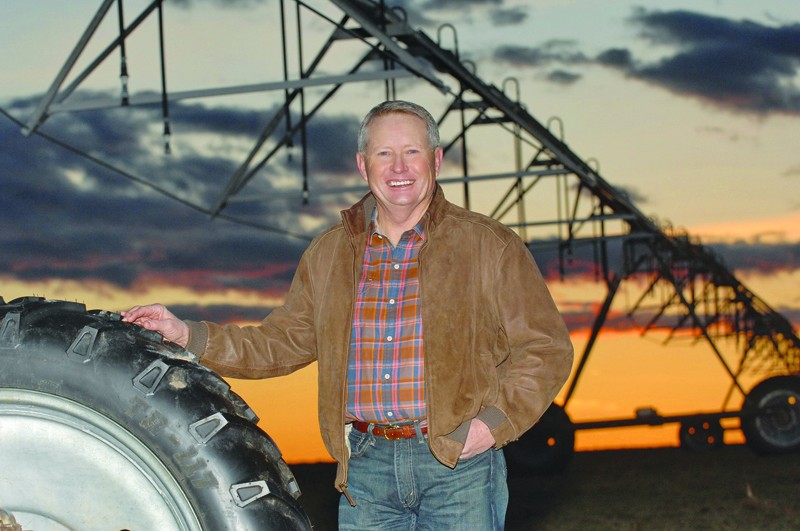Ag commissioner makes local visit

MONTE VISTA— The Colorado Agricultural Commission held a town hall and commission meeting recently at the Colorado Potato Administrative Committee in Monte Vista to discuss today’s agricultural challenges and successes in the state.
Topics discussed included the 2018 Farm Bill, Colorado’s hemp crop, NAFTA, tariffs and the development of potato markets in other countries.
The commission typically holds one meeting around the state each year as a way of bringing relevant news to local farming communities and to listen to and address the concerns of farmers and residents alike. “I like to get into the communities and get a feel for how things are going agriculturally,” said Colorado Agricultural Commissioner Don Brown.
Local SLV farmers Segundo Diaz and Alvin Kunugi attended. The two men serve as commission board members representing District 3 and are statutorily granted the authority to advise and work with the Colorado Department of Agriculture. The commission is important to local farmers for a variety of reasons, said Diaz. Not only do they keep an eye on farming trends and rules, but they also oversee the department’s budget, make recommendations to the commissioner and recommend the appointment of members to a number of advisory boards and committees.
“They also benefit us by looking at opportunities to open up new markets,” Diaz added.
Hemp was one point of discussion at the meeting. “Colorado currently has the largest hemp acreage in the nation at about 30,000 acres,” Brown said. Interest in hemp as a crop is growing in the San Luis Valley due to the plant’s drought hardiness and potential as a commodity. But hemp is still federally classified as a Schedule 1 drug. “You have to be really careful right now about where you plant hemp because it’s a federally illegal crop,” Brown said. What this means for hemp growers is the ineligibility of federal assistance if hemp is grown on land that qualifies for federal subsidies, such as conservation stewardship programs.
The good news is that the new farm bill could change hemp’s illegal designation. “I think we’re going to see that federal law change in the new farm bill, which is being supported by Senator Mitch McConnell from Kentucky,” Brown said. “Once that changes, hemp will be treated like any other commodity---like corn, wheat or hay---and that will help a lot.”
Brown expects the newest version of the farm bill to pass sometime in the near future. “Maybe during the lame duck session in December,” he said, “but we just don’t know yet.”
Another issue is that the hemp market is still in its infancy. “There are different hemp plants grown for seed, oil and fiber, and we have yet to see if we have a market for fiber as a commodity,” Brown said. “We also need to see if there is enough demand for hemp fiber over cotton. The marketplace has a great way of shaking things out, but that’s still one of the unknowns.”
The impacts on the U.S. farming community from the dismantling of NAFTA was also discussed. Mexico and Canada are top importers of Colorado agricultural products, from corn and wheat to hay and potatoes. Mexico recently imposed tariffs on processed potatoes, like French fries, which left Colorado’s fresh potato market unscathed. But it’s hard to measure the impact, Brown said. “Since there are tariffs, that means there is less going into the country. And that means damage to the fresh market to some degree.”
In breaking news just days after the meeting, the USMCA (U.S.-Mexico-Canada Agreement) trade agreement was put into place between the U.S., Canada and Mexico. USMCA largely maintains NAFTA’s framework, including free trade between the three countries.
But trade concerns extend beyond NAFTA. “We are negotiating on all fronts, including China and the European Union,” Brown said. “And we dropped out of the Trans-Pacific Partnership. So that’s the entire world.” Then there are the tariffs placed on U.S. soybeans by China. While Colorado isn’t big into soybean crops, the potential inability for soybean farmers to sell their product for a fair price could mean growing other crops, like potatoes. This could help Colorado’s potato seed sales. But it may also create more competition down the road.
Last fall, Diaz and folks from the Colorado Department of Agriculture flew to Cuba to begin market discussions for Colorado agricultural products. “We met with some high-level officials and I was encouraged by that market possibly opening up,” Brown said. “It’s not a large market, but in Colorado we are working to open up the Caribbean market, like potatoes and affordable beef cuts. We see Cuba as complementing that.”
Cuba currently purchases their potato seeds from the Netherlands. “We’d love to get them some of our potato seeds so they’re purchasing Colorado potato seeds,” Brown said. “We feel like we opened that door.” The Department of Agriculture is also looking at building markets in the Dominican Republic and other Caribbean countries.
After the town hall and commission report, the group took a potato harvest tour. Brown hails from Yuma County in northeast Colorado. “We grow some potatoes where I come from but when you come to the San Luis Valley, you are seeing the heart of potato production,” he said. You are seeing how it’s really done.”



